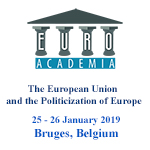Euroacademia Conferences
 Europe Inside-Out: Europe and Europeanness Exposed to Plural Observers (9th Edition) April 24 - 25, 2020
Europe Inside-Out: Europe and Europeanness Exposed to Plural Observers (9th Edition) April 24 - 25, 2020 Identities and Identifications: Politicized Uses of Collective Identities (9th Edition) June 12 - 13, 2020
Identities and Identifications: Politicized Uses of Collective Identities (9th Edition) June 12 - 13, 2020 8th Forum of Critical Studies: Asking Big Questions Again January 24 - 25, 2020
8th Forum of Critical Studies: Asking Big Questions Again January 24 - 25, 2020 Re-Inventing Eastern Europe (7th Edition) December 13 - 14, 2019
Re-Inventing Eastern Europe (7th Edition) December 13 - 14, 2019 The European Union and the Politicization of Europe (8th Edition) October 25 - 26, 2019
The European Union and the Politicization of Europe (8th Edition) October 25 - 26, 2019 Identities and Identifications: Politicized Uses of Collective Identities (8th Edition) June 28 - 29, 2019
Identities and Identifications: Politicized Uses of Collective Identities (8th Edition) June 28 - 29, 2019 The European Union and the Politicization of Europe (7th Edition) January 25 - 26, 2019
The European Union and the Politicization of Europe (7th Edition) January 25 - 26, 2019 7th Forum of Critical Studies: Asking Big Questions Again November 23 - 24, 2018
7th Forum of Critical Studies: Asking Big Questions Again November 23 - 24, 2018 Europe Inside-Out: Europe and Europeanness Exposed to Plural Observers (8th Edition) September 28 - 30, 2018
Europe Inside-Out: Europe and Europeanness Exposed to Plural Observers (8th Edition) September 28 - 30, 2018 Identities and Identifications: Politicized Uses of Collective Identities (7th Edition) June 14 - 15, 2018
Identities and Identifications: Politicized Uses of Collective Identities (7th Edition) June 14 - 15, 2018
Yugoslavia on Instagram: The (Re)Construction of a Collective Identity from the Past
-
-

-
Presentation speakers
- Elisabetta Zurovac, University of Urbino Carlo Bo, Italy
- Giovanni Boccia Artieri, University of Urbino Carlo Bo, Italy
Abstract:
Social media represent a space that allows users to collect memories and, by sharing them, to connect with those who think and feel the same about the past. In this paper we analyze the intergenerational case of Jugonostalgija on Instagram where users are rebuilding a socio-cultural yugoslav sphere in a tension among ‘culture of nostalgia’ and ‘nostalgic culture’ (Velikonja 2008), playing different languages and aesthetics, producing content that refer to the same cultural references of the past. This allows them to respond to the need of reaffirming a common ‘we sense’, a feeling of belonging above the borders, prohibited by the national states. By a qualitative visual content analysis (Julien 2008) of 52 Instagram accounts related to Yugoslavia, we observed the generational relation between media and time in Jugonostalgija. The findings of this work allowed us to better understand the role of images in this peculiar collective identity (re)construction. From this meeting between different generations emerges a Yugoslavia which is multifaceted and plural in its expressions. It responds in different ways to the need of remembering ‘how we were’ and to reaffirm as fundamental for individual identities that common feeling of belonging, that made that ‘us’ a people. In our case study we observed at the same time ‘Last Yugoslavs’ (Palmberger 2016) sharing songs they loved remembering their lost home and younger generations sharing their UGC in order to connect with other jugos online beyond national border. At least, on this part of the internet where ‘brotherhood and unity’ are reinforced by concatenations of memes, by digital archives of a denied collective memory (Ugrešić 1996) preserved by mainstream media and by the ultimate collective desire to forget the war.
-
Related Presentations

The Media Reception of the Refugee Wave in the European Countries Outside the Schengen Area
- Gordana Tkalec
- Iva Rosanda Žigo

Measure and Limit: Thinking of Europe at the Meridian
- Sandro Gorgone













